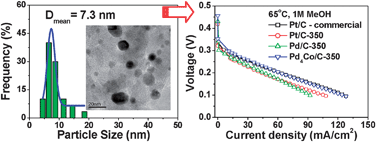Carbon-supported Pd4Co nanoalloy samples (denoted as Pd4Co/C) have been synthesized by a modified polyol reduction process, involving a mixture of ethylene glycol (a polyol) and a small amount of sodium borohydride as reducing agents, and evaluated as electrocatalysts for the oxygen reduction reaction (ORR) in fuel cells. The synthesis process offers Pd4Co nanoparticles with an average particle size of 4.6 nm and a narrow size distribution, which increases to 7.3 and 11.0 nm on annealing, respectively, at 350 and 500 °C in 10% H2–90% Ar. Although the as-prepared Pd4Co/C sample exhibits instability during ORR, annealing at 350 and 500 °C enhances the stability significantly due to an increasing degree of alloying between Pd and Co and increasing particle size. While both Pd/C and Pt/C exhibit a drastic decline in catalytic activity on annealing at 350 and 500 °C due to a significant increase in particle size, the Pd4Co/C sample maintains high catalytic activity even after annealing at 350 °C due to an increase in the degree of alloying. The Pd4Co/C catalyst offers an added advantage of excellent tolerance to methanol poisoning and lower cost compared to the conventional Pt/C catalyst.

You have access to this article
 Please wait while we load your content...
Something went wrong. Try again?
Please wait while we load your content...
Something went wrong. Try again?


 Please wait while we load your content...
Please wait while we load your content...